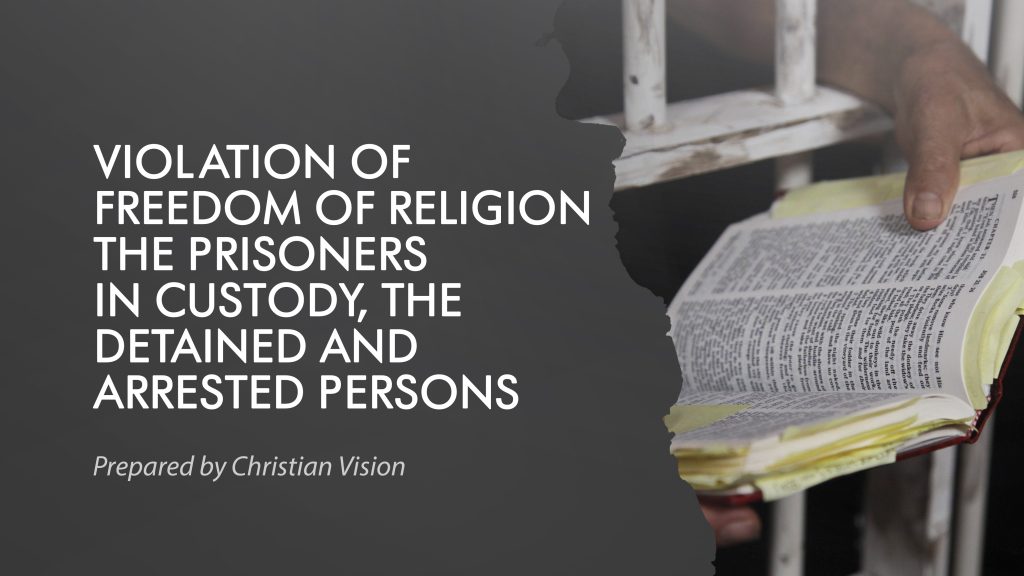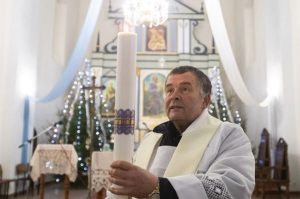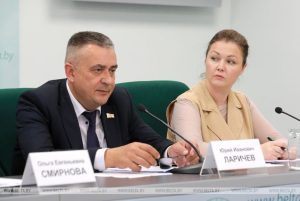Violation of freedom of religion of the prisoners in custody, the detained and arrested persons


Organisation"Christian Vision"
Belarusian inter-Christian association, created during peaceful protests of 2020.
Information about the «Christian Vision». Founding statement of the «Christian Vision» Working Group. The mission of the «Christian Vision».

As of 17 December 2025, there were 1,167 persons imprisoned for political reasons in Belarus whose names became known to human rights activists. Many of them are practising believers. They experience severe restrictions on their freedom to practice religion and beliefs. Infringements also apply to the detained persons, those who serve administrative arrest, being held in custody and serving a sentence in the form of restriction of freedom in open-type correctional facilities, as well as people sentenced to a restriction of freedom without being sent to an open-type correctional institution (“home khimiya”).
These restrictions relate to six main aspects.
Firstly, violent and illegal confiscation of objects of worship.
The Regulations of the Internal Regime of Correctional Institutions state (app. 3, clause 17) that convicts may have objects of worship made of base metals. The Rules of Internal Procedures in the Places of Serving Administrative Arrests (chapter 10) provide for the freedom of practice religious beliefs, rituals and ceremonies by the detainees under the Administrative Code, including “those who are administratively arrested have the right to receive religious items for personal use (including pectoral crosses, amulets), except for religious objects made in the form of piercing and cutting objects, or the objects that may cause bodily harm to oneself or other persons or are of cultural or historical value or items made of precious metals or stones” (p. 80). Despite that, objects of worship are often illegally confiscated from believers.
In December 2021, a rosary was confiscated from Mikita Yemialyianau serving a sentence in Mahilioŭ prison no. 4. He received this rosary for prayer from the auxiliary bishop of the Mahilioŭ archdiocese, Aliaksandr Yasheuski SBD, who visited the prisoner.
Rosaries were not given to Dzianis Ivashyn, a Catholic Christian political prisoner when he was in Hrodna prison no. 1. The journalist’s family gave rosaries to the believer twice. As it became known in September 2023, the administration of the Hrodna prison confiscated them and refused to return them. The first rosary was seized during the cell search. When Ivashyn complained demanding the return of the rosary, the prison psychologist referred to the fact that the supposed prayer item looked like the so-called ‘prisoner’s beads’ and could make other prisoners envious and provoke conflicts. Consequently, this rosary was returned to Ivashyn’s relatives after he was transferred to Mahilioŭ. The second rosary was taken from the believer by the guards when he was transferred again to the Hrodna prison for the announcement of the verdict; it has not been found.
Political prisoner Volha Klaskouskaya served time in women’s penal colony no. 4 in Homeĺ and was released in December 2022. In July 2023, she reported that the deputy head of the penal colony, Stanislau Kavaliou, instructed the removal of all church images in the leisure rooms, where convicts were obligated to watch Belarusian TV channels and propaganda videos, according to information she received from political prisoners. The most active convicts collected icons from all the rooms and brought them to the prison. Klaskouskaya suggests that the prison administration’s fight against shrines may be part of the system’s ongoing conflict with universal human values, such as morality, spirituality, decency, and mercy. Even neutral and harmless things that do not support the government are viewed by the authorities as a rebellion and a danger to the “correct ideology” and their safety.
Seizures of pectoral crosses from the detainees or arrested persons under the Administrative Code take place.
Orthodox believer Dzmitry Karneyenka from Viciebsk served several administrative arrests for in total of 40 days in September-October 2020 and January-February 2021 according to art. 23.34 (parts 1 and 3) of the Administrative Code. He testified that, despite protests (since such a prohibition of wearing an important religious symbol “strongly hurts his religious feelings”), his cross was taken away every time.
On 16 November 2020, Raman Abramchuk, an Orthodox Christian, made public a routine practice of taking away crosses from detainees at the police station: “When [the police officer] cut everything off — indeed, they cut off everything lace- or belt-like and throw it to the feet — I asked to leave with me at least the cross. In response, he cut it off with particular force and threw it to my feet”. Such treatment of religious objects is unacceptable. It constitutes a violation of the right to keep religious objects in places of preliminary detention and while serving a prison sentence: “the objects of worship, if this does not harm the health nor infringes on the rights and legitimate interests of others” (art. 25 of the Law On Freedom of Conscience and Religious Organizations). This also constitutes humiliation of the human dignity of the believer for whom a religious object has a sacred meaning.
The same is corroborated by the Orthodox believer Aleh Nahorny who was sentenced to administrative arrest for anti-war publications in November 2022. His pectoral cross “was the simplest, tiny, on the simplest thinnest thread, barely passing over his head. To strangle oneself or someone with this cross is completely unrealistic. So I attribute this ban to torture when they are trying to morally hurt and suppress Orthodox believers”.
Secondly, multiple cases of banning religious literature for inmates in pre-trial detention and those serving custodial sentences were recorded.
The Law On Freedom of Conscience and Religious Organizations guarantees the right to have, receive, acquire and use religious literature in such cases. The provisions of article 10 of the Law On the Procedure and Conditions for Keeping Persons in Custody confirm this right. Administratively arrested individuals have the right to obtain and use religious literature, which is outlined in paragraph 80 of the Rules of Internal Procedures in the Places of Serving Administrative Arrests.
However, there are cases where obstacles were created to exercising this right. Thus, the administration of a pre-trial detention centre (SIZO no.1 Valadarskaha Street in Minsk) refused to accept literature for prisoners and sent it back to the sender. In October 2020, a Roman Catholic activist Artiom Tkaczuk sent Catholic magazines to political prisoners: Maxim Znak, Dzmitry Furmanau and Eduard Palchys. The magazines were returned with a note saying that “newspapers, magazines, and crosswords are allowed only by subscription from a post office”.
In November 2020, Zmitser Dashkevich received back 42 out of 70 copies of the New Testament he had sent to political prisoners in SIZO no. 1; the accompanying note said that “the persons in custody have the right to use literature from the SIZO library.”
The same applies to the inmates serving administrative arrest. On 23 December 2020, Iryna Petrusevich, a Roman Catholic, posted a Christmas card, a wafer and the text of the Christmas Day worship printed out from the official website of the Roman Catholic Church in Belarus, Catholic.by, to her friends serving an administrative arrest in Žodzina and Baranavičy prisons after being sentenced under Art. 23.34 of the Code of Administrative Offences. The inmate in Baranavičy received only a card and wafer, while the inmate in Žodzina received nothing.
Volha Zalatar, a Roman Catholic believer, informed of obstacles in receiving a prayer book.
On 16 April 2021, a political prisoner Irena Bernatskaya’s daughter, Weronika Piuta, shared on Facebook that her mother had not received religious literature posted to her. Only a prayer book was allowed. Bernatskaya was detained on charges of alleged incitement to hatred (Article 130 of the Criminal Code) on 25 March. She was held at the detention centre (SIZO) no. 1 in Minsk.
On 7 January 2022, the mother of Artsiom Bayarski, an Orthodox Christian, detained on 24 March 2021, reported that all attempts to pass on a prayer book to her son were unsuccessful: prayer books, as well as any other literature, were rejected by the staff at the pre-trial detention centre (SIZO) no. 1 in Minsk where Bayarski has been held from mid-April to the end of 2021.
In his Facebook post on 13 October 2021, Zmitser Dashkevich mentioned that he sent around ten copies of the New Testaments to the colonies where political prisoners were kept, but they all were returned to him. A letter with a printed 22nd Psalm of David, which he sent to political prisoner Dzianis Urad, was also returned with a note that letters not from close relatives were not allowed.
In January 2021, the Christian Vision group made its first statement regarding the violation of the right to religious literature in relation to political prisoners in Belarus. However, obstacles to accessing religious literature persist. On the eve of the Easter holiday (Grigorian calendar), persons under administrative arrest in the temporary detention centre in Žodzina were once again denied to receive a Bible; the administration claimed that both detainees and prisoners had access to the library. However, the number of copies in the library is insufficient and access to the Bible in the Belarusian language is difficult. A new statement from the Christian Vision group was also sent by email to the leaders of the following six Christian denominations in Belarus: Belarusian Orthodox Church, Roman Catholic Church in Belarus (including the nunciature), Union of Evangelical Christian Baptists in the Republic of Belarus, The Association of Conservative Churches of Evangelical Christian Baptists in the Republic of Belarus, the United Church of Evangelical Christians, the Association of Communities of Full Gospel Christians in the Republic of Belarus.
In March 2021, after the inmates’ complaints about the conditions of their detention, all their writing tools, paper, scanwords and books, including a prayer book, were taken away from the arrested persons in cell 23 of the Center for Isolation of Offenders on Akrescina Street. Musician Aliaksei Krukouski, an Orthodox believer, was held at the detention centre on Akrescina Street in Minsk, then — at the detention centre in Žodzina between 26 April and 7 May 2021. His administrative arrest under Art. 23.34 coincided with the Passion Week and Easter holiday. During his detention, Krukousky was deprived of all correspondence, including Easter greetings and letters with fragments of the church service texts and laminated paper icons. According to the believer, the morning greeting by Metropolitan Veniamin was the only religious content on the first channel of the Belarusian state radio available; the inmates were forced to listen to it in the daytime.
Believing political prisoners may be denied access to the prison library.
Thus, former political prisoner and journalist Yauhien Merkis, an Orthodox believer who served his sentence in Correctional Colony No. 17 in Šklou, noted in an interview with the human rights center Viasna that political prisoners had no opportunity to take books from the library — not even the Bible — and were forced to make arrangements with other prisoners.
According to the testimony of another former political prisoner, upon admission to Correctional Colony No. 14 in Navasady, prisoners’ Bibles and other literature were confiscated, even though this contradicted the internal regulations approved by Ministry of Internal Affairs Decree No. 147. He reported:
As other prisoners told me, in December 2024, before those same elections, several dozen colony officers burst into each unit and swept away absolutely all books. That is, there was not a single privately owned book left in the colony. If a new prisoner arrived, their Bible was taken away. This amounted to an extrajudicial confiscation of property. In my case, in January 2025 all religious literature was also taken from me. I argued with them, my wife called the Department of Corrections. For demanding that I be given a Bible, I was sent from one isolation cell to another for months. Only one month before my release was it returned to me — but immediately before my release, in the KGB pre-trial detention center, it was stolen again.
Bibles are also confiscated upon admission to Correctional Colony No. 1 in Navapolack, as stated in an interview with Viasna by a political prisoner of the Protestant denomination. According to him,
the administration may also transfer confiscated books to the library collection, and then you can obtain the literature that was taken from you through the library. But in that case, those books no longer belong to you.
The Bible was also confiscated upon admission to the women’s correctional colony in Zarečča from political prisoner Palina Sharenda-Panasiuk, as she stated in an interview.
Thirdly, there are obstacles to subscribing to even the religious publications featured in the official Belpochta, state-owned distributor, catalogue.
As of 24 May 2021, subscriptions to the Roman Catholic newspaper of the Viciebsk Diocese, Katalicki Vesnik, were not permitted in prison no. 4 in Mahilioŭ. The prison employees simply deleted the newspaper, as well as the Belorussy i Rynok newspaper, from the catalogue available to inmates. Specifically, Mikita Yemialyianau, a political prisoner held in Mahilioŭ prison, did not manage to subscribe to the newspaper for the second half of 2021. Yemialyianau’s relatives appealed to the prison administration on this matter. In a written response, the head of the prison, D. Eliseenko, informed that the May 2021 issue of the Katalicki Viesnik newspaper was not distributed to the prisoner in accordance with Article 89 Part 2 of the Penal Code: «convicts may not receive, acquire, store, distribute or subscribe to the publications promoting war, incitement to racial, ethnic and religious hatred, violence or cruelty, as well as pornographic publications.» The letter did not specify the kind of prohibited information the May 2021 issue of the newspaper contained. On 8 November, it became known that the head of a pre-trial detention centre (SIZO) no. 1 in Minsk, Andrei Tsendrik, mentioned the changes to the Internal Regulations of Investigative Detention Centers in his response to the appeal of the relatives of one of the political prisoners. From paragraph 169 was excluded the following: «A subscription for the detainee can be made by his relatives or other persons». Consequently, a subscription can only be made by detention centres’ staff. This change was made on 30 June 2021 and has been applied since 23 September.
Fourth, there are serious obstacles to pastoral visits to believers in detention centres.
Orthodox believer Paval Sieviaryniec was detained on 7 June 2020. Initially, he served several consecutive administrative arrests for 75 days in total. Later, he was transferred to pre-trial detention centre no. 1 in Minsk as a suspect under Art. 293 of the Criminal Code (Organization of mass riots). There, he was held until April 2021. Then he was transferred to the investigative prison no. 4 in Mahilioŭ. During his stay in pre-trial detention centre no. 1, Sieviaryniec made at least five written requests for a pastoral visit by an Orthodox priest. The prisoner’s wife, Volha Sieviaryniec asked for the same three times. Clergy and activists of religious organisations also petitioned for the visit permission on Paval Sieviaryniec’s behalf. For nine months, a pastoral visit was not permitted even once. For the first time, a pastoral visit to Paval Sieviaryniec became possible in the period after the verdict was passed and before it came into force, during his stay in the investigative prison no. 4 in Mahilioŭ. At that time, the court that passed the verdict was in charge of allowing such a visit. The visit took place on 8 June 2021 according to the short-term visits provision: through protective glass, using a telephone set, excluding physical contact for sacraments and without ensuring the confidentiality of the conversation.
The mentioned previously Irena Bernatskaya, a well-known Roman Catholic from Lida and political prisoner, held at the detention centre no. 1 in Minsk, requested a pastoral visit by a priest at least on two occasions. According to the Facebook post of her daughter, Weronika Piuta, the requests were turned down. Prison administration justified their refusals by the unfavourable Covid-related epidemiological situation.
At the same detention centre no. 1, the above-mentioned Volha Zalatar, a Roman Catholic believer, requested pastoral visits by a priest on several occasions. All requests wre turned down. 70 Catholic priests from Belarus submitted written petitions to the investigative committee asking to end Zalatar’s criminal prosecution. Two priests, including Zalatar’s parish priest, Fr Alexandr Famianych, submitted sureties for changing the measure of her restraint. On 2 June 2021, the Apostolic Nuncio in Belarus, Archbishop Ante Jozić, made a pastoral visit to Zalatar in the pre-trial detention centre.
On 4 May 2021, the Christian Vision group published a statement regarding the obstacles to pastoral visits experienced by Paval Sieviaryniec, Irena Bernatskaya and Volha Zalatar. On 5 May 2021, the group called on the Conference of Catholic Bishops of Belarus and the Apostolic Nunciature in the Republic of Belarus to take steps to resolve the current situation with regard to the detained Catholic women.
Artsiom Bayarski, an Orthodox Christian, was detained on 24 March 2021. Since then, he has been under arrest. On 9 December 2021, he was sentenced to five years of imprisonment in a high-security facility. For the whole of this time, he has never been allowed to receive a pastoral visit. While in a pre-trial detention centre (SIZO) no. 1 in Minsk after the sentence was passed and before it came into force, Bayarski requested a pastoral visit arranged for him by his mother. Judge Alena Shyko who passed the sentence and therefore represented the body responsible for permitting such a visit turned Bayarski’s request down. His mother, Volha, said: “People have been in jail for a year, they cannot meet with a priest or go to confession. I believe that this is an infringement of the rights of believers.”
In June 2024, katolik.life, the Belarusian Catholic publication, published the testimony by a recently released from detention Catholic believer. In the testimony, she spoke about how religious life operates in prison. Firstly, even though the believer twice submitted an application to the head of the prison about meeting with a Catholic priest, she received an answer that the priest’s visits were “not provided” for those under investigation. Secondly, the believer also did not receive permission to attend at least the Orthodox liturgy in the prison chapel – for the same reason.
Fifth, a serious problem is the obstruction of religious life for convicts in penal colonies and open-type penal facilities, as well as those serving their term of “home khimiya”
Alena Maushuk, an Orthodox believer sentenced to six years in a general regime colony as part of the so-called Pinsk case and serving the sentence in the colony no. 24 in Zarečča (Rečyca district, Homieĺ voblasć), made requests for a meeting with a priest. In a letter to Maushuk, Very Rev. Piotr Prakaptsou (Homieĺ eparchy of the Belarusian Orthodox Church) advised her of an Orthodox service taking place on 25 August 2021 and the possibility of a pastoral conversation or confession with a priest. The colony administration, however, prevented the political prisoner from taking part in that service. Only on 24 October 2021, Alena Maushuk finally was allowed to meet with a priest.
This problem is systemic. Yuliya Kashaverava, a nurse from Viciebsk who served her sentence in colony no. 4 in Homieĺ and was released on 16 September 2021 after being pardoned, reported that. According to Kashaverava, political prisoners are not allowed to visit “neither activity clubs nor church nor sports facilities nor places of study.” In April 2023, human rights activists reported that the administration of the Homieĺ women’s colony no. 4 exerts pressure on some political women prisoners by preventing them from attending church.
In the summer of 2021, political prisoner Mikita Yemialyianau serving a four-year maximum-security colony sentence in prison no. 4 in Mahilioŭ applied for permission to be visited by a priest. On 11 October 2021, Yemialyianau was placed in a punishment cell for twenty days for an alleged violation of the rules of the prison’s internal order. On the same day, Yemialyianau began a hunger strike protesting against the denial of a priest to visit him. On 25 October 2021, the Christian Vision group issued a statement regarding the violation of Mikita Yemialyianau’s right to freedom of religion. According to human rights activists, on 27 October, the prison administration asked Yemialyianau to make a new pastoral visit request. He was assured that such a visit would be permitted. Following that, Yemialyianau stopped the hunger strike on 30 November. According to information from human rights activists and Yemialyianau’s family, a pastoral visit took place on 3 or 4 November. Yemialyianau received the sacraments of confession and communion from Bishop Aliaksandr Yasheuski SBD.
Christian Reformed believer, Uladzimir Matskevich, experienced systematic refusals of pastoral visits. From 4 to 17 February, he was on a hunger strike demanding to see a pastor. The New Life Full Gospel Church (Minsk) pastor, Viachaslau Hancharenka, attempted to visit Matskevich in a pre-trial detention centre (SIZO) no. 1 in Minsk but was not allowed by the administration. A Christian Reformed pastor from Mahilioŭ, Siarhei Udaliou, did not manage to submit a visit request due to his community lacking state registration. Several Protestant churches in Germany sent letters to Syarhei Pasko, head of the Minsk department of the Investigative Committee of the Republic of Belarus, and Andrei Tsedryk, head of the detention centre no. 1, requesting a pastoral visit to be allowed. The letters were ignored. The Christian Vision group adopted a special statement regarding Uladzimir Matskevich’s hunger strike. The group demanded that Matskevich would be able to exercise his right to meet with a minister of religion for spiritual support.
Siarhei Tsikhanouski, an Orthodox believer, was held in solitary confinement for five years — more than two of them in incommunicado detention. Following his release in June 2025 with the assistance of the United States, he stated that throughout the entire five years of his imprisonment, he was never once granted a pastoral visit, the opportunity to confess, or receive Holy Communion, despite experiencing a deep spiritual need:
“For more than five years, I wasn’t allowed to go to confession. Imagine — an Orthodox Christian not being allowed to confess or take Communion. The law says: once a month. In pre-trial detention, in prison — once a month. Letters, calls, priest, lawyers — nothing.”
In February 2023, it became known that the administration of an open-type penal facility no. 46 in the town of Kruhlaje (Mahilioŭ voblasć) prevents Siarhei Vasilyeu, a Roman Catholic believer, from visiting the church. The police lieutenant colonel Ihar Ivitski refused the permission since — according to him — the Roman Catholic churches are not on the list of places that convicts are allowed to visit.
In September 2023, it became known that the correction facility no. 17 in Škloŭ convicts with a yellow label indicating political prisoners were not allowed to visit the Orthodox church located on the territory of the colony.
Former political prisoner and journalist Yahor Martsinovich, who served time in correctional colony no. 2 in Babrujsk, also mentioned that the so-called ‘low status’ convicts were explicitly prohibited from visiting an Orthodox church; a notice about that hung at the entrance to the church.
Political prisoners are not allowed to attend the funerals of their deceased family members. Paval Sieviaryniec serving a sentence in correction facility no. 17 in Škloŭ could not attend the funeral of his father, Kanstantyn Sieviaryniec, who passed away on 1 October 2021 from coronavirus. On the eve of the funeral, the Christian Vision group appealed to the heads of the Orthodox and Catholic Churches in Belarus, and to the bishops of the dioceses in the Mahilioŭ voblasć where the Škloŭ correction facility is located, as well as to the Apostolic Nuncio, Ante Jozić, with a request to petition the Department for the Execution of Punishments for the permission for Paval Sieviaryniec to attend his late father’s funeral.
In June 2024, the Belarusian Catholic resource «katolik.life» cited the testimony of a Catholic believer who had recently been released from prison about how religious life is organized in prison. Firstly, despite the fact that the believer twice submitted an application to the head of the prison about the possibility of meeting with a Catholic priest, she received a response that a visit from a priest was «not provided» for those under investigation. Secondly, the believer also did not have permission to attend at least the Orthodox liturgy in the prison chapel — for the same reason.
The restrictions also apply to the persecuted for political reasons serving a sentence in the form of the so-called “home khimiya” – freedom restriction without being sent to an open-type correctional institution. Thus, former political prisoner Rehina Lavor, the founder of the Museum of National Cultures in Iŭje, who was sentenced to two years of the “home khimiya” revealed that she was only allowed to leave the house for two hours a day and was forbidden to visit the Roman Catholic church.
On 16 July 2021, the human rights organisation, Forum 18, published a review of the violations of the rights of detainees, the arrested and imprisoned persons related to freedom of religion or belief. It noted that the refusal to permit pastoral visits and access to religious literature for political prisoners contradicts both Belarusian legislation and the UN Standard Minimum Rules for the Treatment of Prisoners (known as the Mandela Rules). In another report from 12 November 2021, the human rights organisation, Forum 18, drew attention to the obstruction of pastoral visits to prisoners and restrictions on access to religious literature in places of detention.
In July 2025, Forum 18 published a new report on violations of freedom of religion and belief in Belarusian prisons.
The report is based on testimonies from four political prisoners who were released and deported to Lithuania on 21 June 2025, as well as on monitoring data from Christian Vision, focused on freedom of religion for those persecuted on political grounds.
The right to practice religion is effectively limited to the Orthodox service — and even that is not always accessible to political prisoners. “God may call you to church, but it’s the prison administration who decides,” says journalist Ihar Karney. Witnesses describe systematic denial of access to religious services, confession, and spiritual literature. Representatives of other denominations — Catholics, Protestants, Muslims — are often denied visits from clergy, or their requests are simply ignored.
For example, Siarhei Tsikhanouski, an Orthodox believer, was never allowed to confess or receive communion during more than five years of imprisonment. In the Shklov colony, a Catholic inmate was told to convert to Orthodoxy if he wanted to attend church. The Bible can only be accessed through the prison library, but inmates are allowed only one book — and only from a pre-approved Orthodox list. One inmate was punished for showing interest in the Quran.
Forum 18 emphasizes that these restrictions violate not only Belarusian law, but also international standards — in particular, the Mandela Rules. Prison authorities have refused to comment on the situation.
In August 2025, Christian Vision interviewed Siarhei Tsikhanouski, who answered a series of questions about the religious freedom restrictions he faced while incarcerated. He once again noted that he had never been allowed to receive communion or go to confession throughout his five years in prison. He was also denied access to his personal Bible.
Sixth, there is systemic discrimination against believers who belong to religious communities and denominations other than the Belarusian Orthodox Church.
Thus, political prisoner Dzmitry Kazlou noted that there are many believers from Catholic and Evangelical churches in detention, but that he “never once saw a Catholic church, or anything else like that, anywhere in such religious facilities. The attitude toward Catholics there is much worse. They are simply ignored.” He was held in Correctional Colony No. 2 in Babrujsk, where at first “Protestant pastors regularly came and conducted sermons, including via video link,” but later “all of this was banned: video sermons stopped, pastors were no longer allowed in, and only rare visits by an Orthodox priest remained, who gives lectures once a month.”
Kazlou also cited the example of political prisoner Andrei Budai, a representative of the charismatic movement, who was not allowed to participate in Protestant gatherings.
Restrictions on visits by Protestant pastors, according to the testimony of one evangelical Christian who served his sentence in Correctional Colony No. 14 in Navasady, also took place in that colony:
Before the last so-called presidential elections, Protestants in the Navasady colony were prohibited from holding worship services. Previously, a minister from a Protestant church used to come there. Usually, Protestant prison ministries are led by people who themselves had once been imprisoned, and then repented and came to God. That is why they understand prison life better, and above all, the people to whom they preach. Ministers came with festive concerts for Christmas and Easter. Services were held in the assembly hall. Before the elections, all of this was banned. Officially, no one from the administration explained the ban. They simply said that elections were coming, that there was a certain escalation now, and that later there would supposedly be some easing.
The same evangelical believer also noted that in the Navasady colony, for a believer to be able to participate in worship services, the “brigadier” of the Protestant ministry had to compile a special list and submit it for approval to the colony administration. According to him, this list was signed by as many as three or four heads of the colony:
As far as I know, no such list was required for the Orthodox church. They said it like this: if you go to a service and you have not been approved on the list, it will be considered a violation, and you will be immediately placed in solitary confinement. And there really were such cases in the colony. Later, all prisoners convicted under political articles, all ‘extremists,’ were removed from this list. Therefore, even when after my release from the punishment cell or the cell-type facility I periodically spent a few days in the detachment, I could not attend worship services, because it was forbidden to me.
In 2025, Protestant pastors were completely barred from entering the Navasady colony, and believers were forced to organize worship services on their own.
In 2025, Protestants in this colony also faced another form of discrimination: the colony administration took from the Protestant “brigadier” the names of everyone who corresponded with Protestant churches and banned their correspondence, instructing censors not to let letters from these believers through.
Another political prisoner, who served his sentence in Correctional Colony No. 1 in Navapolack, told the human rights center Viasna in an interview that in this colony there was only an Orthodox church—a separate one-story building with bells outside. Protestant believers were not allowed access to ministers, and from religious life only personal prayer and reading of Holy Scripture were available. He was not aware of any cases of prayers being held by prisoners themselves in the library or assembly hall:
Perhaps other believers met in a local section or in the industrial zone, if they really wanted to pray together somewhere in a corner where the cameras did not ‘reach.’ Perhaps only non-political Christian prisoners were allowed to gather for prayer in the library.
Former political prisoner Palina Sharenda-Panasiuk, a Greek Catholic believer who served her sentence in the women’s colony in Zarečča, stated that while Orthodox believers had at least some opportunity to meet with a priest or attend a church, “there is no Catholic church there. There was absolutely no possibility to meet with a Catholic or Greek Catholic priest.”
She also noted that although Evangelical churches were actively working in this women’s colony in 2022–2023, from 2024 it became forbidden to receive parcels from these churches, and preachers were no longer allowed to visit the colony.








